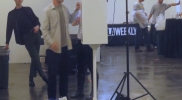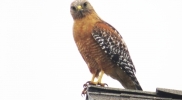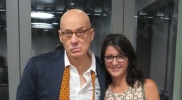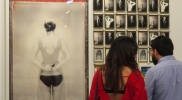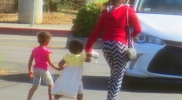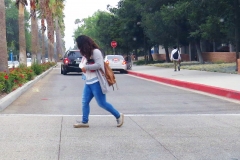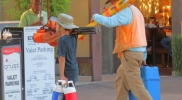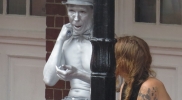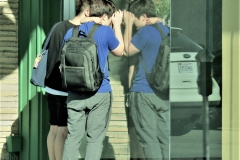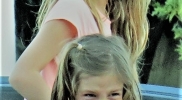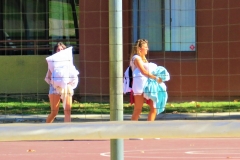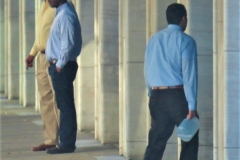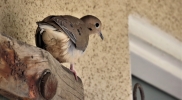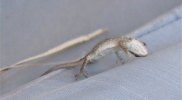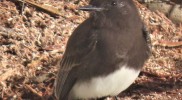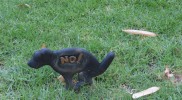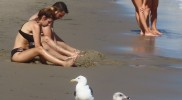|
Favorite Trivia: KNOWLEDGE & IMAGINATION & WISDOM
|
| “Everyone is ignorant, only on different subjects.”
Will Rogers
|
| “Ah, not in knowledge is happiness, but in the acquisition of knowledge.”
Edgar Allen Poe – “Power of Words,” Poe’s Poetical Works
|
| “The brain records what enters through the filter of preconceptions.”
Toni Packer – The Wonder of Presence
|
| “Don’t ever take a fence down until you know why it was put up.”
Robert Frost
|
| “The world we have made as a result of the level of thinking we have done thus far creates problems we cannot solve at the same level of thinking at which we created them.”
Albert Einstein
|
| “The brain is a wonderful organ; it starts the moment you get up in the morning and does not stop until you get to the office.”
Robert Frost
|
| “Tell me and I forget. Teach me and I remember. Involve me and I learn.”
Benjamin Franklin
|
|
“The problem of education is twofold: first to know, and then to utter. Everyone who lives any semblance of an inner life thinks more nobly and profoundly than he speaks.”
R. L. Stevenson, Lay Morals (Christopher Morley’s Book of Days for 1931 [October 2])
|
| “The more you know, the more you understand, and the more you get to laugh!”
Patty Martino Alspaugh
|
| “Enjoy when you can, and endure when you must.”
Johann Wolfgang von Goethe
|
| “When in charge, ponder. When in trouble, delegate. And when in doubt, mumble.”
James H. Boren
|
| “Those students get the highest grades who take their responsibilities of educating me most seriously.”
Theodore Roethke
|
| “Logic will get you from A to B. Imagination will take you everywhere.”
Albert Einstein
|
| “If I were asked why I do not go along with the world and share its opinions, I should recall the fable of the fox declining the lion’s invitation to enter his den, because the footprints point in only one direction.” [Epistles, I. I.]
Horace: Satires, Epistles and Ars Poetica, trans. by H. Ruston Fairclough
|
“. . . It would be nice
to buy tickets for a trip to the
self. It must be somewhere inside us.
Every morning I wash
my thoughts
in cold water.
That way they come out fresh as a daisy. . .”
Attila Jozsef
|
| “If at first the idea is not absurd, then there is no hope for it.”
Albert Einstein
|
| “The state of not-knowing, especially for a person of age and accomplishment, recaptures youth’s novel excitements. This is a way of keeping young that Mrs. Delany engaged in throughout her widowhood. Not to know is also sometimes the position of the poet, who depends on close observation to magnify a subject, hoping to discover an animating spirit. There’s romance in that forensic impulse, because it yields surprise—an antidote to the jaded mind age has to fend against.”
Molly Peacock – The Paper Garden: Mrs. Delany [Begins Her Life’s Work] at 72
|
| “It is the mark of an educated mind to be able to entertain a thought without accepting it.”
Aristotle
|
“I keep six honest serving-men,
(They taught me all I know);
Their names are What and
Why and When,
And How and Where and Who.”
Rudyard Kipling
|
| “Make learning your reason for living.”
David Baird – A Thousand Paths to Enlightenment
|
|
“An open mind is all very well in its way, but it ought not to be so open that there is no keeping anything in or out of it. It should be capable of shutting its doors sometimes, or it may be found a little draughty.”
Samuel Butler, Notebooks (Christopher Morley’s Book of Days for 1931 [February 6])
|
| “The years teach much which the days never knew.”
Ralph Waldo Emerson
|
| “. . . all wisdom consists in this, not to think that we know what we do not know.” [Ad Academica., I, 4.]
Cicero
|
| “History: If history repeated itself, learning history would be much easier.”
Evan Esar – Esar’s Comic Dictionary
|
| “With every answer come two new questions.”
David Baird – A Thousand Paths to Enlightenment
|
| “Certainly our ignorance of impending evils is better than our knowledge of them.”
Cicero
|
| “Knowledge is the only instrument of production that is not subject to diminishing returns.”
J.M. Clark
|
| “Copying from one is called plagiarism, but if you copy from many it’s called research.”
David Baird – A Thousand Paths to Enlightenment
|
| “You can’t complain about what’s wrong if you don’t know what’s right.”
Patty Martino Alspaugh
|
| “Get the facts first. You can distort them later.”
Mark Twain
|
| “As soon as things get difficult, I walk away. That’s the great secret of creativity. You treat ideas like cats: you make them follow you. If you try to approach a cat and pick it up, hell, it won’t let you do it. You’ve got to say, ‘Well, to hell with you.’ And the cat says, ‘Wait a minute. He’s not behaving the way most humans do.’ Then the cat follows you out of curiosity: ‘Well, what’s wrong with you that you don’t love me?.’ “Well, that’s what an idea is. See? You just say, ‘Well, hell, I don’t need depression. I don’t need worry. I don’t need to push.’ The ideas will follow me. When the’re off-guard, and ready to be born, I’ll turn around and grab them.”
Ray Bradbury – Zen in the Art of Writing
|
| “When you can see what everybody else has seen but be thinking what nobody else has thought, you will have discovered your creativity.”
David Baird – A Thousand Paths to Creativity
|
| “Don’t find fault. Find a remedy.”
Henry Ford
|
| “The best place to begin the quest for creativity is the moment you wake on a new day. Tell yourself that anything is possible, then get up and see what it is.”
David Baird – A Thousand Paths to Creativity
|
| “Although it is admirable to be wiser than others, it is definitely unwise to tell them.”
David Baird – A Thousand Paths to Enlightenment
|
| “I do wish to run, seize this greatest time in all the history of man to be alive, stuff my senses with it, eye it, touch it, listen to it, smell it, taste it, and hope that others will run with me, pursuing and pursued by ideas and ideas-made machines.”
Ray Bradbury – Zen in the Art of Writing
|
| “Lots of knowledge fits into a hollow head.”
Karl Kraus
|
| “Your worst enemy cannot harm you as much as your own thoughts, unguarded. But once mastered, no one can help you as much.”
Dhammapada
|
| “What we become depends on what we read after all of the professors have finished with us. The greatest university of all is a collection of books.”
Thomas Carlyle
|
| “It is far better to understand a little than to misunderstand a lot.”
David Baird – A Thousand Paths to Enlightenment
|
“And Fancy, I tell you, has dreams that have wings,
And dreams that have honey and dreams that have stings,
Dreams of the maker, and dreams of the teller,
Dreams of the kitchen, and dreams of the cellar;
Some that are tall, and some that are dwarfs,
Some that are haltered, and some that wear scarfs;
Some that are proper, and signify o’thing,
And some another, and some that are nothing.”
from masque Vision of Delight – Ben Jonson
|
| “. . . life is a process of the gradual attainment of knowledge through experience, whether sensuous or intellectual.”
Richard Shiff – “Art and Life: A Metaphoric Relationship” (On Metaphor)
|
| “The tricky part of wisdom is that it usually necessitates a bicameral mind-set: at its heart, wisdom is the knowledge of what is true or right or just. But it also needs a healthy sense of doubt, because without that you’re an ideologue.”
Henry Alford– How To Live: A Search for Wisdom from Old People
|
| “A fundamental key to creativity is assiduous and frequent questioning.”
David Baird – A Thousand Paths to Creativity
|
| “The important thing is not to stop questioning.”
Albert Einstein
|
| “[Edward] Albee told me that he thinks wisdom is a matter of perspective. He said, ‘Maybe it’s finally being able to figure out what you should be worrying about and what you shouldn’t be worrying about.'”
Henry Alford– How To Live: A Search for Wisdom from Old People
|
“Wisdom, by slow degrees, strips off our vices and follies,
Teaching us what is right. For Vengeance always is silly,
The proof of a mean little mind.”
The Thirteenth Satire: For a defrauded friend (The Satires of Juvenal – trans. by Rolfe Humphries)
|
| “In a changing world, metaphor renders the truth of experience as the truth of knowledge, for it is the means of passing from individual immediacy to an established public world; the new must be linked to the old, and the experience of any individual must be connected with that of his society… acts of genius or dramatic breakthroughs in fields of study can affect our present world order only if they are joined to it by means of a powerful metaphor. Indeed establishing the metaphoric bridge itself may be considered the act of genius, and the entry into new areas of knowledge is its consequence… Art, regarded as expression or communication, functions as metaphor, linking the individual to this expanding world.”
Richard Shiff – “Art and Life: A Metaphoric Relationship” (On Metaphor )
|
| “I am always doing that which I cannot do, in order that I may learn how to do it.”
Pablo Picasso
|
| “If you lose, make sure you don’t lose the lesson too.”
David Baird – A Thousand Paths to Enlightenment
|
| “An investment in knowledge pays the best dividends.”
Benjamin Franklin
|
| “All memory has to be reimagined. For we have in our memories micro-films that can only be read if they are lighted by the bright light of the imagination.”
Gaston Bachelard – The Poetics of Space
|
| “Genius means little more than the faculty of perceiving in an unhabitual way.”
David Baird – A Thousand Paths to Enlightenment
|
| “When two minds begin sparking off of one another the result is pure creative magic.”
David Baird – A Thousand Paths to Creativity
|
| “Tis like a foghorn I hear. To imagine so, is to take me to the Sea and out of the Valley.”
Patty Martino Alspaugh
|
| “The less men think, the more they talk.”
Montesquieu
|
| “How can housework be made into a creative activity? The minute we apply a glimmer of consciousness to a mechanical gesture, or practice phenomenology while polishing a piece of old furniture, we sense new impressions come into being beneath this familiar domestic duty. For consciousness rejuvenates everything, giving a quality of beginning to the most everyday actions.”
Gaston Bachelard – The Poetics of Space
|
“The obscure we see eventually. The completely obvious, it seems, takes longer.”
Edward R. Murrow
|
| “Imagination is more important than knowledge.”
Albert Einstein
|
| “Creative people are the masters of their minds, not mastered by their minds.”
David Baird – A Thousand Paths to Creativity
|
| “Creative sense is not always common sense.”
David Baird – A Thousand Paths to Creativity
|
| “Wisdom begins in wonder.”
Socrates
|
| “It is never enough to look at a thing once, always try a different perspective.”
David Baird – A Thousand Paths to Tranquility
|
| “Don’t expect the impossible of yourself—there are limitations to being human.”
David Baird – A Thousand Paths to Tranquility
|
| “Make your own bible. Select and collect all the words and sentences that in all your reading have been to you like the blast of triumph.”
Ralph Waldo Emerson
|
| education: “The ability to describe fully a bathing beauty without using your hands.” – San Francisco Chronicle
Leonard Louis Levinson – Webster’s Unafraid Dictionary: Defiant Definitive Put-Downs
|
| “. . . good Sense, Learning, and Wisdom, are Qualifications that recommend a Man, and make him Valued every where, and at all times.” [DLXVII]
The Moral Maxims And Reflections of the Duke De La Rochefoucauld
|
| ‘In a lifetime, we stuff ourselves with sounds, sights, smells, tastes, and textures of people, animals, landscapes, events, large and small. We stuff ourselves with these impressions and experiences and our reaction to them. Into our subconscious go not only factual data but reactive data, our movement toward or away from the sensed events. . . “Here is the stuff of originality. For it is in the totality of experience reckoned with, filed, and forgotten, that each man is truly different from all the others in the world. For no man sees the same events in the same order, in his life.”
Ray Bradbury – Zen in the Art of Writing
|
7 Liberal Arts: Grammar teaches correct speech
Logic, the proper use of words
Rhetoric ornaments them
Music sings
Arithmetic reckons
Geometry measures
Astronomy deals with the heavens
Classical and Foreign Quotations (ed. by W. Francis H. King)
|
| “I love my thinking self.”
Patty Martino Alspaugh
|
| “Where the Sartrean imagination involved a radical negation of things—issuing in an essential ‘poverty of being’—Bachelard saw imagination as the coming into being of language. Not non-being but surplus-being: being as incessant birthing of newness through images.”
Richard Kearney (Introduction to Gaston Bachelard’s The Poetics of Space)
|
| “What, think you, my friend, are my prayers? . . . May I have a goodly supply of books and of food to last the year . . . But ’tis enough to pray Jove, who gives and takes way, that he grant me life, and grant me means: a mind well balanced I will myself provide.” [Epistles, I. XVIII.]
Horace: Satires, Epistles and Ars Poetica, trans. by H. Ruston Fairclough
|
| “Avoid a questioner, for he is also a tattler. Open ears will not keep secrets loyally, and the word once let slip flies beyond recall.” [Epistles, I. XVIII.]
Horace: Satires, Epistles and Ars Poetica, trans. by H. Ruston Fairclough
|
| “He loves what my sorrows have made me, my efforts, my courage, my aspirations . . . With all his beauty, he [Rupert Pole] looks upon the beautiful girls in his college (he could have them all) but he says, ‘They do not have this . . . this . . . this . . .’ (he cannot find the words) ‘. . . this warmth you have, this growth.’ C’est moi qu’il aime, my flavors, my elixir, and I feel worthy because it was my labor, my effort, my struggle to become what I am, every word, color, every form I had to make, to create.” [Los Angeles, May 8, 1948]
Trapeze: The Unexpurgated Diary of Anaïs Nin, 1947-1955 – ed. by Paul Herron
|
| “. . . my job, however fun, frustrating, exhausting or exhilarating, is not my life . . . less-traveled roads offer the most stunning views, open minds invite surprise . . . I regularly vary my route to work. I skip my usual Tube stop and get off somewhere else; I take a different path to the office; or I simply walk on the other side of the street—small alterations that keep me off the well-worn path and change my point of view. Fresh perspectives can squeeze through even the slightest breaks in routine.”
James Geary – The World in a Phrase: A Brief History of the Aphorism
|
| “. . . the first step toward not being unconsciously influenced by something was to become conscious of it.”
Ram Dass – Still Here: Embracing Aging, Changing, and Dying
|
| “. . . wisdom is one of the few things in human life that does not diminish with age. While everything else falls away, wisdom alone increases until death if we live examined lives, opening ourselves out to life’s many lessons . . .”
Ram Dass – Still Here: Embracing Aging, Changing, and Dying
|
| “The mind of man is improved by learning and reflection; it is always searching into or doing something, and is led forward by the pleasurable enjoyment of the eye and the ear.” [De Officiis., I, 30.]
Cicero
|
| “I took part in running what’s called an Elder Circle. The oldest people in the group sat in a circle, and the younger people sat around them. We had a talking stick, from the Native-American tradition, and anybody from the inner circle who wanted to could take the talking stick, and share their wisdom with the rest of the group. It was interesting to hear how many of the people in the inner circle said, ‘This is a role I’m totally unfamiliar with, because nobody’s ever asked me to be wise before.’ So many of them flowered in the richness of that opportunity to share their wisdom.”
Ram Dass – Still Here: Embracing Aging, Changing, and Dying
|









